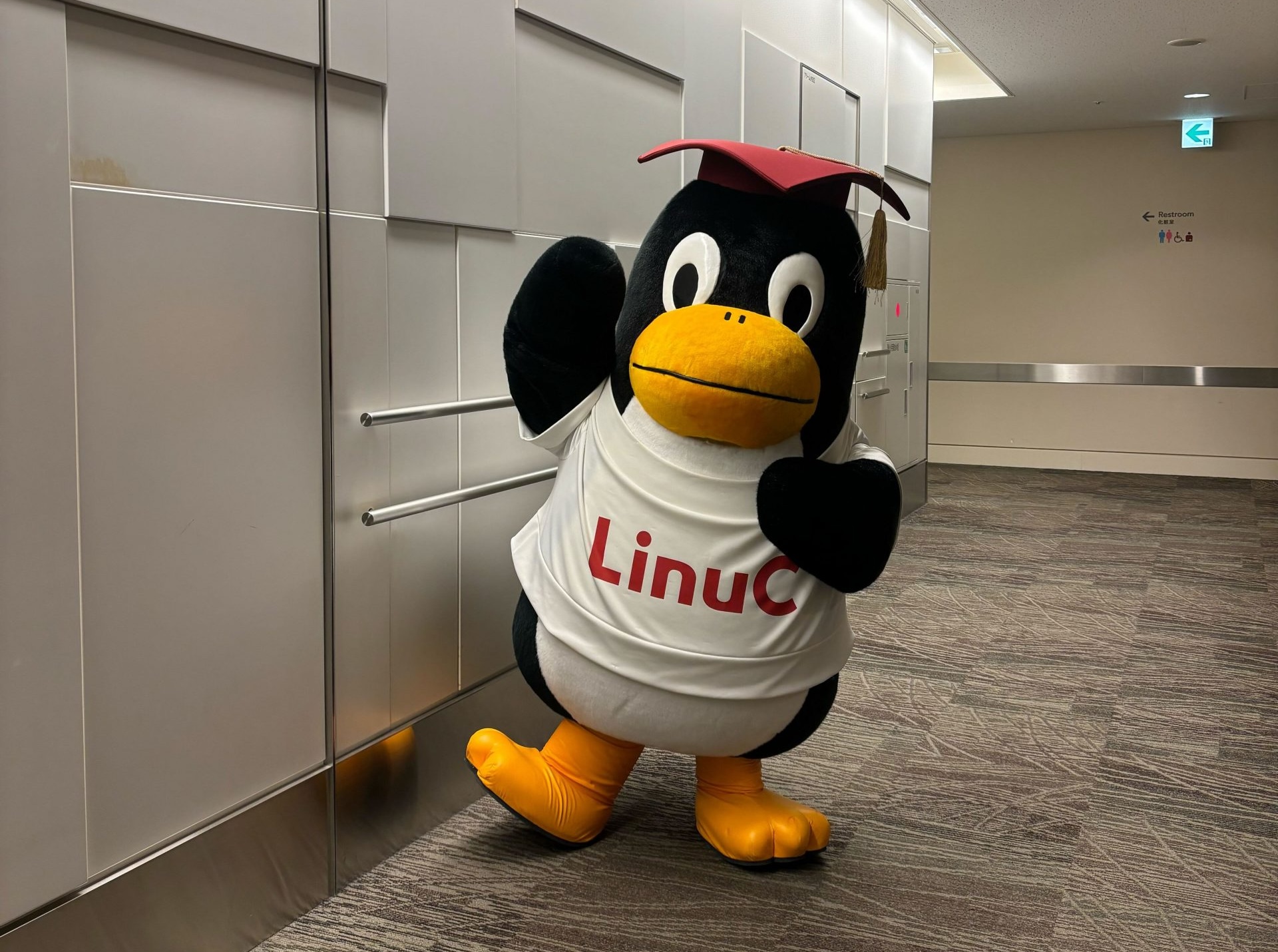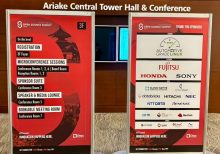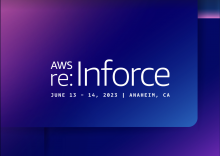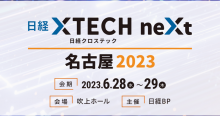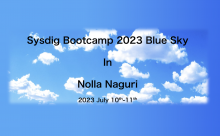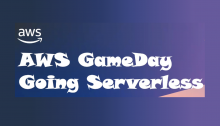Open Source Summit Japan 2023ってなに?
Open Source Summitは、今日のオープンソースに影響を与える最も重要な技術、トピック、および問題をカバーするイベントの集まりで構成される、カンファレンス アンブレラです。
Linux Foundationが開催するオープンソースに関するカンファレンスで、12/5・12/6に開催されました。
2020,2021年とコロナでオンライン開催を余儀なくされていましたが、昨年よりオフライン開催となったようです。
https://events.linuxfoundation.org/open-source-summit-japan/about/about-oss-ja/
なぜ参加した?
最近エンジニアとして3年経ってやっとOSSコントリビューションに挑戦してみて、オープンソースにもっと関わっていきたいと感じていた時にslackで募集を見かけたので応募してみました。
また、技術のカンファレンスに参加することで技術全般への興味やモチベーションが高まるのではないかと考えました。
事前準備
1週間ほど前にオンラインでキックオフミーティングが行われ、当日の流れや注意事項が説明されました。
大半は以前より参加しているメンバーでした。
シフトは各イベントを2,3名でサポートする形で、未経験者と経験者が一緒に行動するようになっており、不安はありませんでした。
早朝
朝は4:30起きで、可能であれば7時に有明セントラルタワー集合とのこと
激眠でした。前日飲み会を断って大正解です。(地味にゆりかもめの一番前特等席から取れて嬉しい)
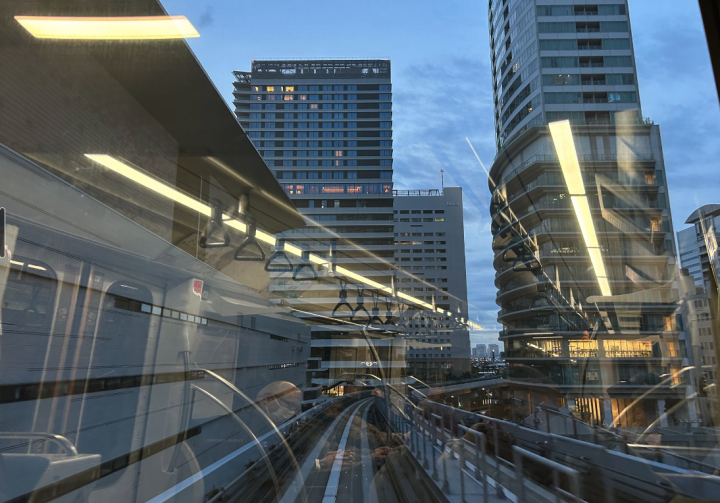
シフト
シフトはエクセルでまとめられていたのですが、人数も多く、整理できないので自分用に作りました。
- 8:00: 受付
- 9:00: Registration(受付) & Badge Pick-up(バッジ渡し) & ドリンクチケット渡し & Tシャツ渡し ※スピーカーギフト(缶/カード)
- 10:30: free
- 11:15: クローク
- 12:05: Bridging Business and Open Source – Takanori Suzuki, Cybertrust Japan Co., Ltd.
- 14:00: Improve the Management of Open Source Community with GPT4 – Vivian Hu, Second State
- 14:50: 受付
- 15:40: Open Source Best Practices and Building Open Source Communities from Scratch – Sujata Tibrewala, ByteDance
- 16:40: クローク
- 17:30: Proposing the Integration of CIP Kernel into AGL – Hirotaka Motai, Cybertrust Japan Co., Ltd.
会場
朝7:00現地集合しました。
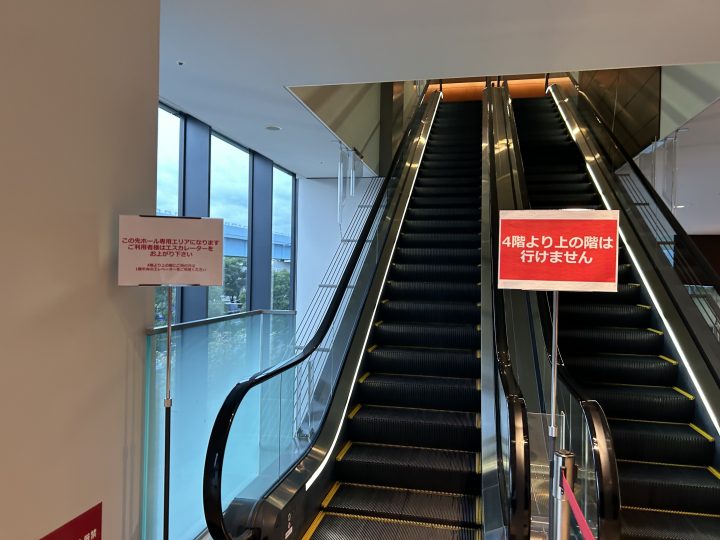
到着すると、ほとんどの人が0日目に参加しているか既に去年等参加していた方ばかりで圧倒されました。
自己紹介すると良い雰囲気になりました。
その後当日のシフトを紙で受け取りました。
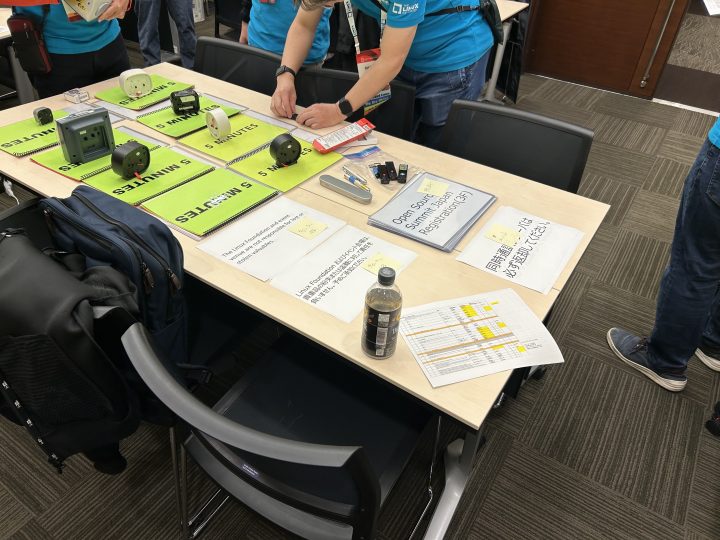
朝礼を行い、挨拶と配置等確認を行います。
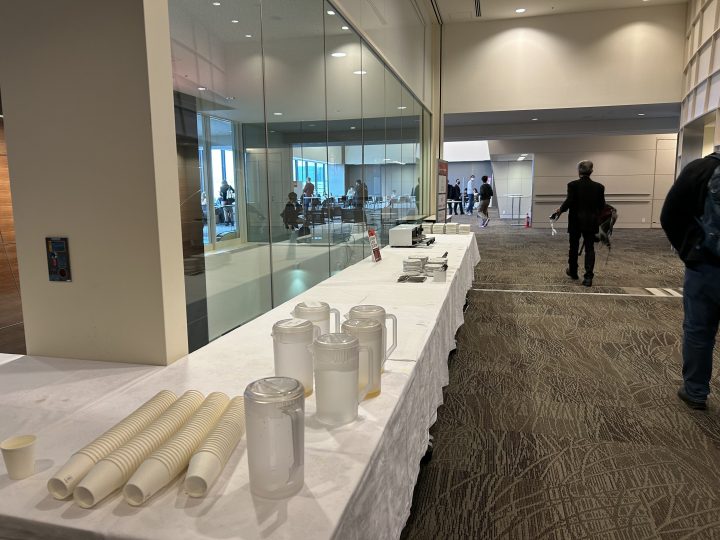
朝食をいただきましたとあげたかったのですが、受付が忙しく朝食食べに行った頃に残っていたのはパンを焼くためのオーブンのみでした…
Registration(受付) & Badge Pick-up(バッジ渡し) & ドリンクチケット渡し & Tシャツ渡し ※スピーカーギフト(缶/カード)
最初のタスクは受付でした。実際は7:30からスポンサー枠の方々等来場していたため、その時間から受付業務を開始しました。
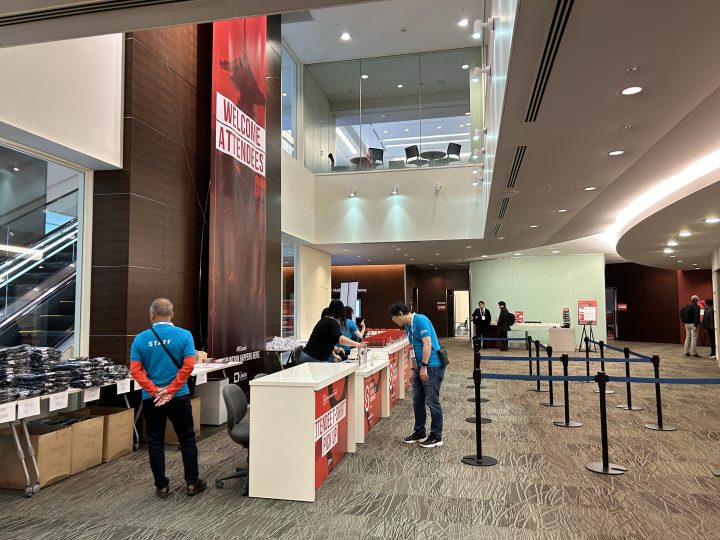
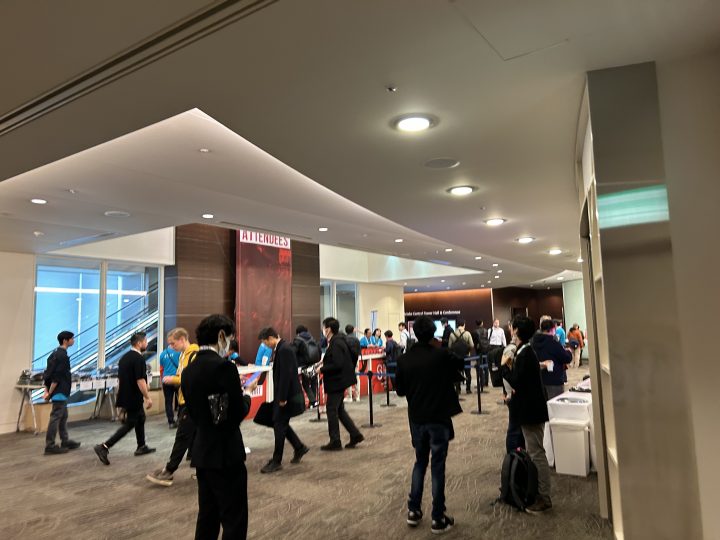
最初は少しずつ来たので余裕ぶって話していたら9:00からのLinusさんによるkeynote前をピークに徐々に列が長くなり、暑くなって半袖の中に来ていたヒートテックを破り捨てようかと思いました。
Linusさんも受付に来たようなのですが、別の参加者の対応に集中しておりそのオーラも感じることができなかったのは1番の後悔です。
代わりにマスコットと写真を撮れたので満足です
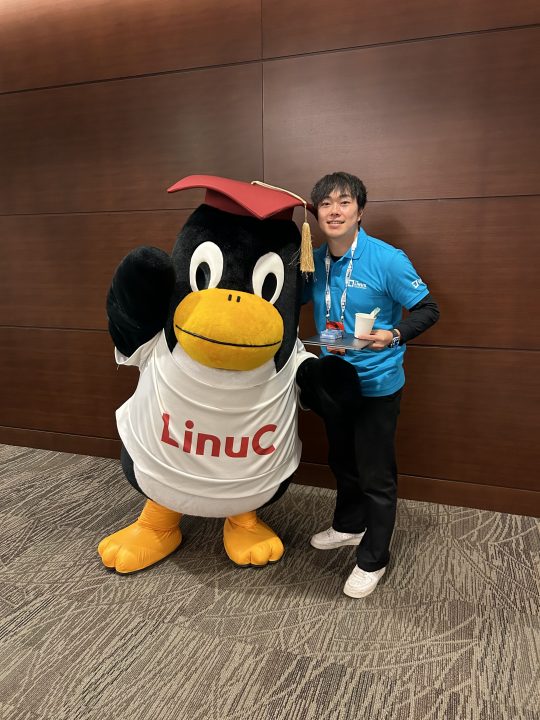
ランチ
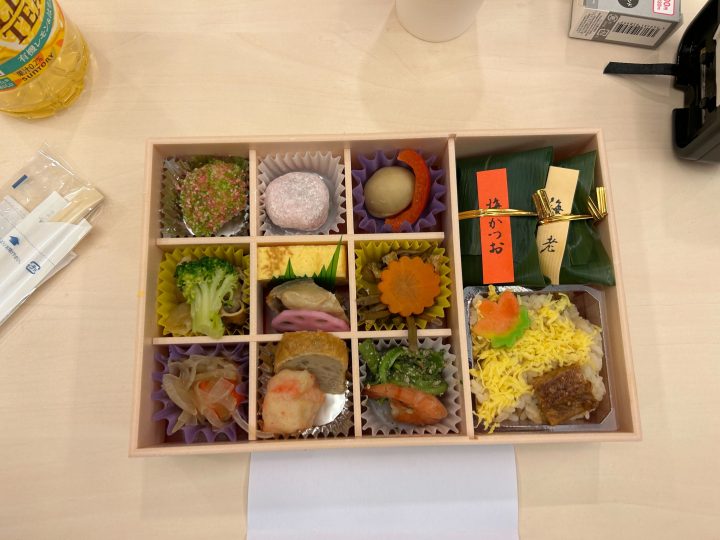
寿司弁当のようなものともう一種類の弁当が用意され、好きな方を選ぶことができました。
かなり余り、捨てることになったため2つ家に持ち帰りました
セッション
2、3回のセッション毎にコーヒーブレイクを挟み、3Fと4Fの6~7つの部屋に分かれてセッションが18:00頃まで行われました。
主なセッション中の業務は三点です。
- タイマー: 終了5, 3, 1分前にスピーカーに知らせる
- カウンター: 一番参加者が多い時に人数をカウントする
- マイク担当: 質問があった際にマイクを質問者に渡す
具体的に受けたセッションは以下の通りです。
Bridging Business and Open Source – Takanori Suzuki, Cybertrust Japan Co., Ltd.
https://ossjapan2023.sched.com/event/1Tyop?iframe=no
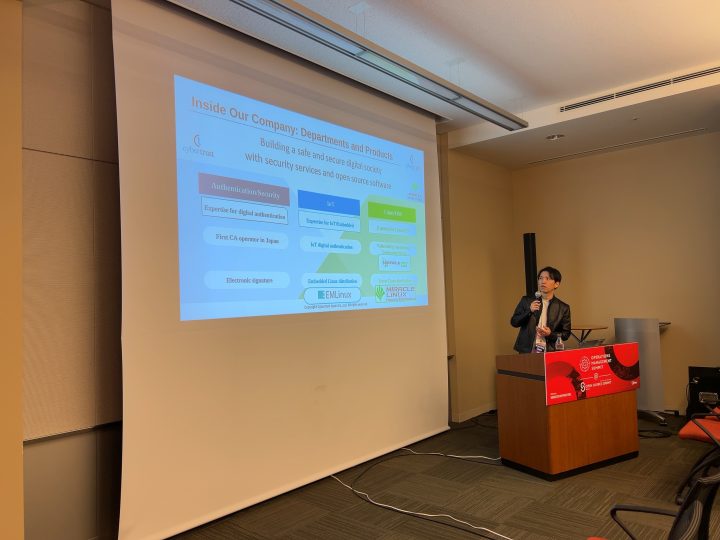
The integration of open source and business within companies offers innovation opportunities. Since the launch of OSPO, we have been working to increase our contribution to open source while respecting the community. During this time, we have been working on our Linux distro, MIRACLE LINUX, and its participation and contribution to AlmaLinux. As a result, our developers can now contribute more broadly through the community via development on AlmaLinux. This includes the enhancement of SBOM generation capabilities, which can be a key part of open source supply chain management for AlmaLinux users. Additionally, we’ve assembled a dedicated team focusing on security enhancements through our participation in OpenSSF activities in Japan. In this session, we will share our experiences in bridging open source and business, explaining the importance of contributing to open source as a company and how to do so. It will be especially helpful for Japanese companies as an example of how to build this bridge.
オープンソースとビジネスの橋渡しに関する経験を共有し、企業がオープンソースに貢献する重要性と方法について説明していただきました。
オープンソースに参画するのは個人だけという勝手な幻想を抱いていた私にとっては意外性のあるものであり、メリットも多く知ることができました。質疑応答では日本人同士であっても英語でコミュニケーションをとっていたので、海外のカンファレンスに来たような気分になれました。
Improve the Management of Open Source Community with GPT4 – Vivian Hu, Second
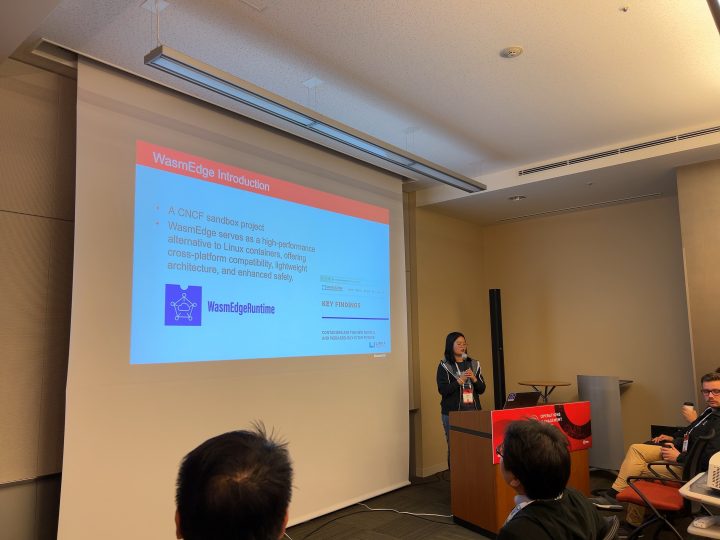
Effective management of open-source communities is vital for the success and sustainability of projects. Traditional methods face challenges in handling the increasing complexities and demands of these communities. In this talk, we introduce a novel approach to community management, leveraging the power of GPT-4 and WasmEdge (A CNCF sandbox project). From automating routine tasks to analyzing community sentiment and facilitating communication, GPT-4 can dramatically improve the efficiency and productivity of open-source projects. During this session, we will explore practical use cases and best practices for leveraging GPT-4 in open source community management, especially the code review agent to help maintainers review the PR first round and chatbot for the specific open source project. We will discuss how GPT-4 can assist in automating repetitive community management tasks, providing personalized support to community members, and promoting a positive and inclusive environment. Additionally, we will address ethical considerations and potential challenges in implementing GPT-4 in open source communities.
GPT4初期から毎日愛用させていただいている私はタイトルに惹かれ、気づけばシフト表に名前を夢中で刻んでいました。実際参加者は席数を超えて大人気のセッションとなっていたことからもここの需要の高さが垣間見えます。
GPT4をフル活用したコミュニティのマネジメントツールについての登壇でした。特にオープンソースコミュニティで具体的にどのようなケースでGPT4がマネジメントに生きるかについて説明していただきました。Pull Requestのレビューなどは普段からGPTに肩代わりしてほしいと思っていたのでとても勉強になりました。レビューは人がやるとミスや見落としが発生する可能性が高く、ユーザーに大きな影響を与える可能性もあるため、こういったものは社内でも導入できると良いと思いました。Docker image pullやstarなどの監視をできることからオープンソースをターゲットにしていますが、いくつか普通のプロジェクトでも使えそうだなと思います。近い将来個人開発したものをOSSにしてこのようなマネジメントを実践してみたいです。
こちらで紹介していたFlows.networkです。
Open Source Best Practices and Building Open Source Communities from Scratch – Sujata Tibrewala, ByteDance
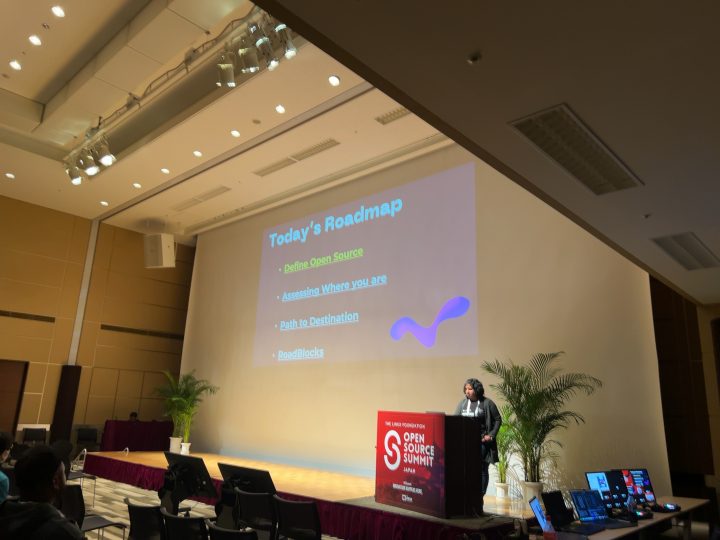
Working in Open source and creating a community for a fledgling open-source project is more than just throwing code off the wall. You may have the best code in the world but if the developers a) don’t know about it, b) feel safe and heard in the community, and c) are confident about the long-term sustainability of the project, your code may just end up being open source, but little else, with you being the lone steward, begging for outside contributors and maintainers. Based on our experience of growing various open-source communities from scratch we will talk about creating frameworks where developers from competing organizations not just feel safe but also welcome and are given due credit and limelight commensurate to their contribution. Working and leading in open source is really a test of leadership skills where you have no influence or authority other than your merit and your ability to listen, understand, and problem-solve while keeping the developer’s interest at the center of everything. In this new world customers seldom care about proprietary solutions since they all want flexibility, and hence navigating the world of open source while also ensuring the business keeps getting customers and keeps making money is always a challenge. This Bird of Feather would encourage discussion on experience in corporate and open-source grassroots managing competing priorities.
さまざまなオープンソースコミュニティをゼロから育てた経験に基づき、競合する組織の開発者が安全であると感じるだけでなく、歓迎され、その貢献に見合ったクレジットと注目を受けられるフレームワークの作り方について話していただきました。確かにオープンソースというのはただ何かを開発したコードにreadme.mdを追加し、publicにするだけではなく、コントリビューションのハードルを下げたりメリットを何か教授できるようになるためにすべきことが多くあるようです。
このプレゼンで一番感銘を受けたのは、大きな部屋でしたがスピーカーの方がかなり積極的に参加者とコミュニケーションを取ろうとしていた点です。こういった場面では緊張して自分の資料の言葉を思い出すのに必死な人も多いと思います。そんな中このスピーカーは何度も手を上げさせたり、開始時間までに参加者とスモールトークをしたりすることで、参加者の興味を引き立たせているように感じました。
Building Hard Real-Time Linux Systems with Xenomai – Jan Kiszka, Siemens
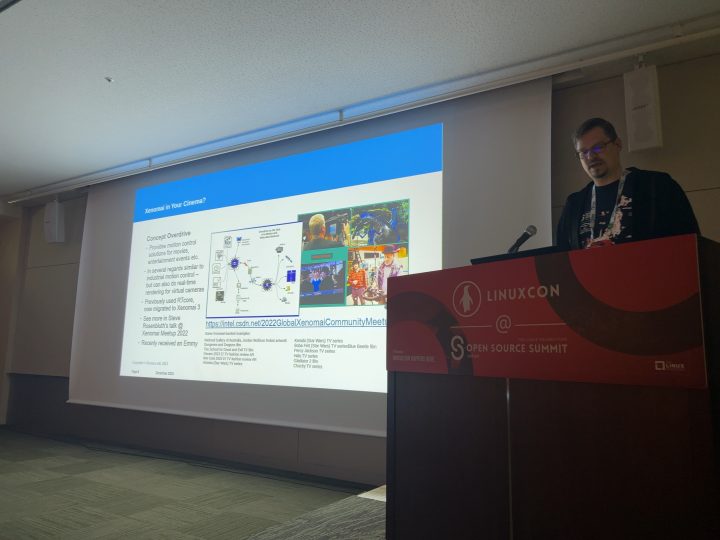
It’s 2023, and the whole real-time Linux world is served by the RT preempt kernel. The whole? Not quite. In this talk, we will explain why Xenomai’s co-kernel architecture still plays a role in building mission-critical deterministic systems with Linux. We will also provide a few examples where Xenomai is in use today, some of them you may have got in touch with without knowing it. We will describe the available kernel and hardware support, how it is maintained, and how this can be expanded when needed. We will explain the differences between the mainstream Xenomai 3 series and the new Xenomai 4 approach and reasons to choose latter or to migrate to it. Finally, we will describe how to create your own Xenomai-based system, from scratch or re-using the pre-integrations of the project.
リアルタイムLinuxの世界がRT preemptカーネルによって支えられている状況を紹介し、その中でXenomaiのコカーネルアーキテクチャがなぜ重要な役割を果たしているのかについてのスピーチでした…。
セッションが始まる前にスピーカーと色々お話しさせていただいて、終わったらたくさん質問しようと意気込んでいました。
しかしKernel周りの知識が皆無だったので、正直何も理解できませんでした。この辺りの知識はCS学位を持っていないと言えど、あるに越したことはないためしっかり知識補強する必要があると感じました。
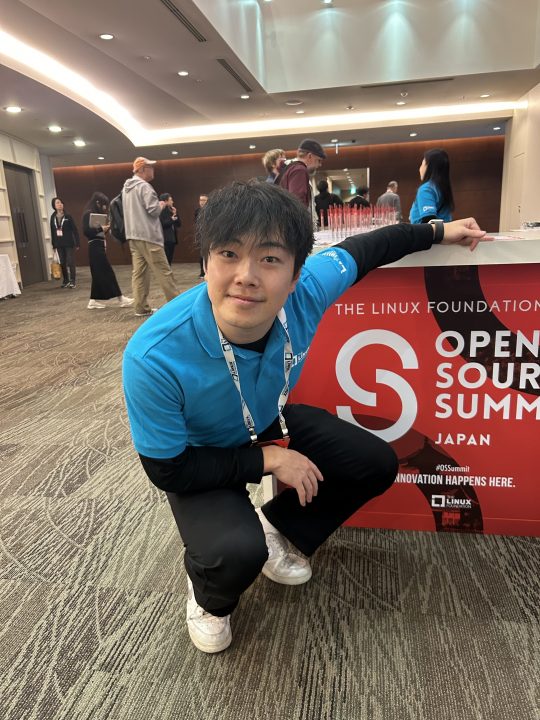
クローク
服や鞄などを預けるクロークが設置されており、その担当も順次行いました。
仲良くなったアメリカからの参加者から現地のお土産ももらいました。
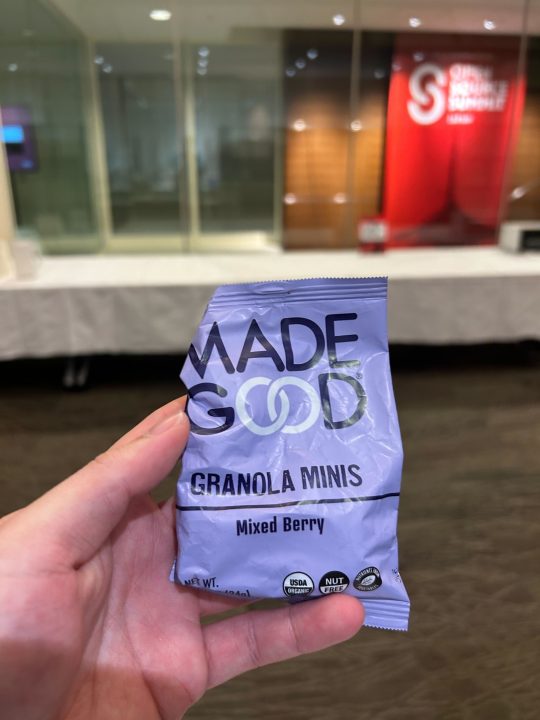
宴会(Reception)
初日が終わって宴会が開催されました!
ボランティアといえど朝昼宴会付きなのでむしろプラスと言ったら少し過言くらいです。
様々なバックグラウンドを持つ方々とお話しできてとても良い経験になりました。
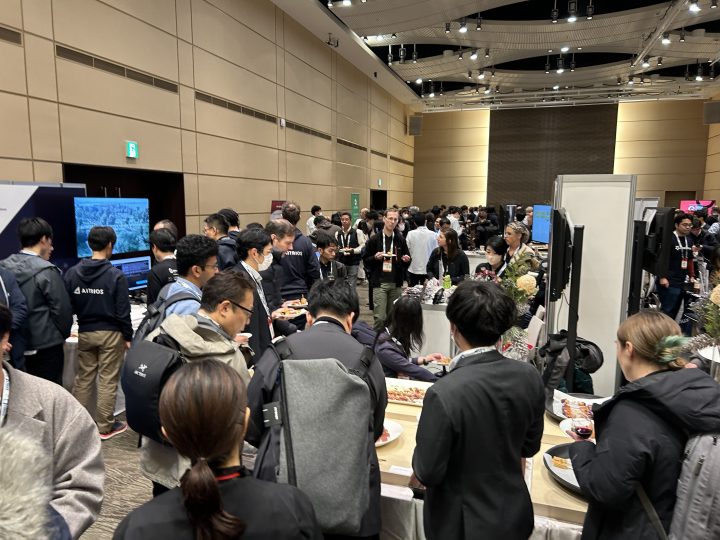
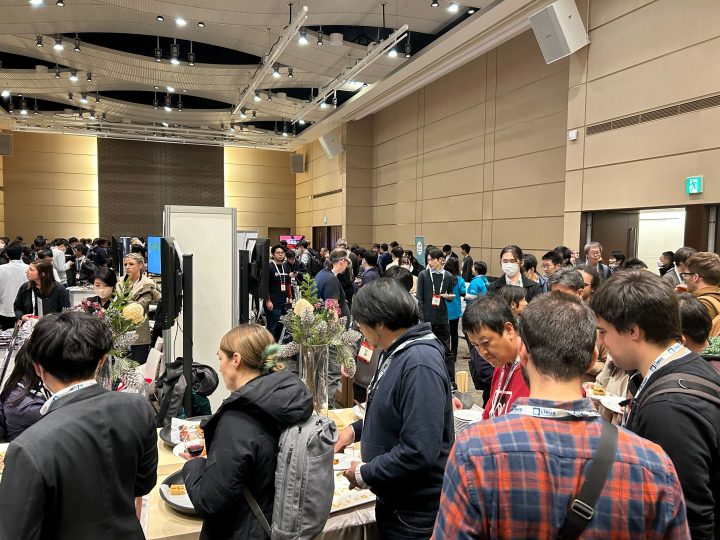
総括
今回参加して良かったこととしては、ボランティアをする中で普段関わりを持つことができないエンジニアの方々と話す中で、未知の技術やカンファレンスに対する姿勢等を学ぶことができ、技術全般に対してのモチベーションが上がったということです。
また具体的にはkarnel周りやハードウェア・セキュリティ周りの知見が圧倒的に欠如していることを再認識したため、日々の業務や個人開発等で知識を補強していきたいと考えています。
また機会があればこういったカンファレンスはサポート側でも参加させていただきたいです!

